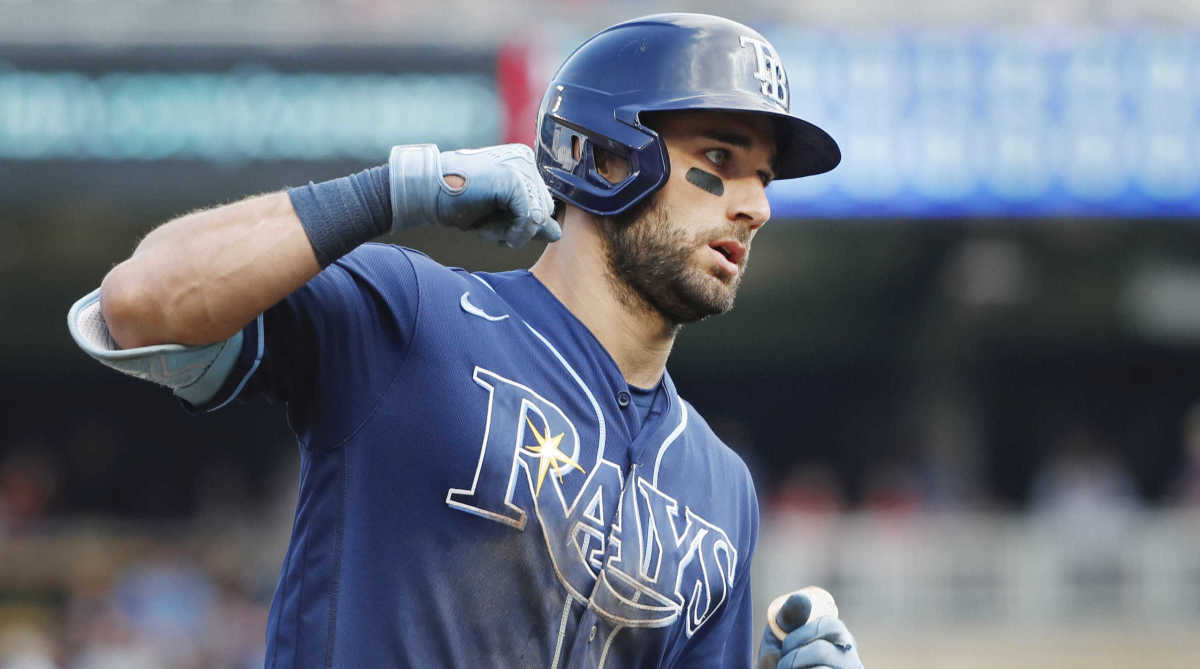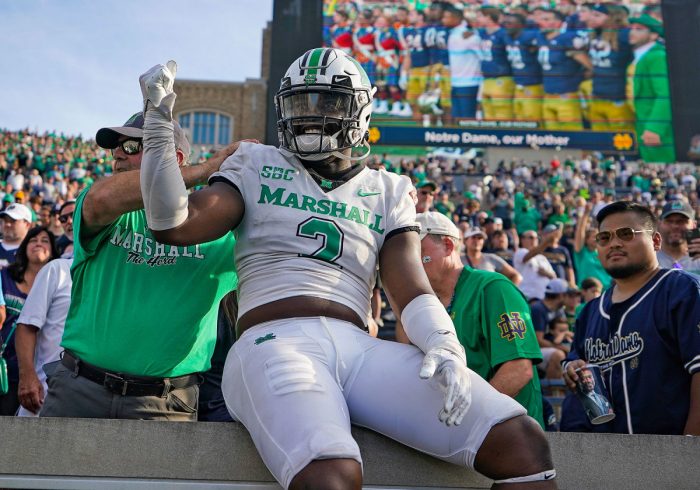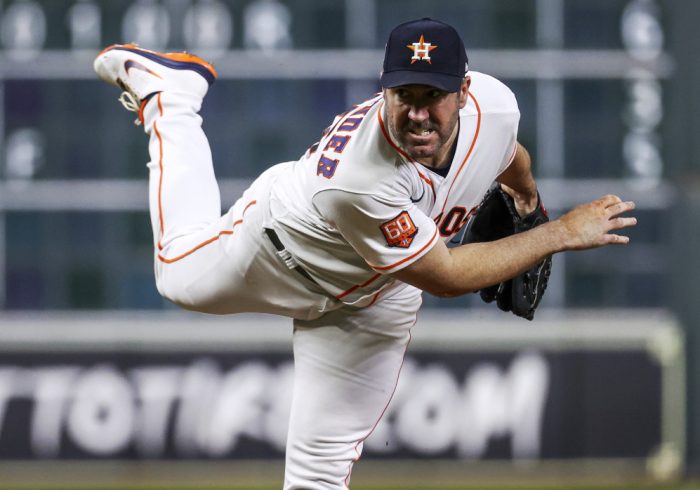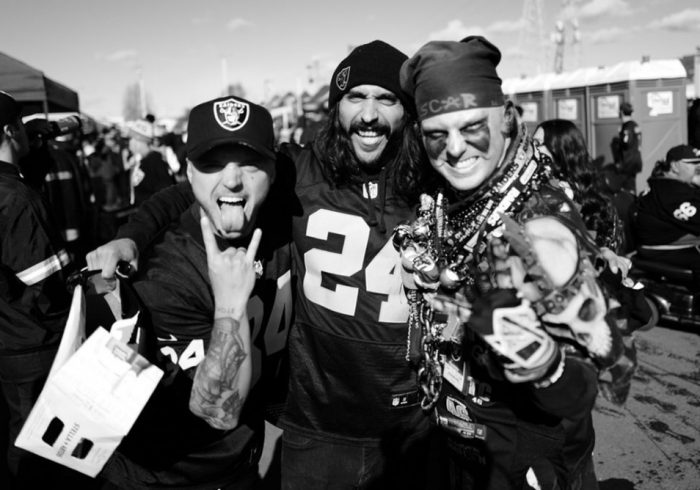In a sign of the times, left-handed hitting played almost no role in the hottest free-agent market in history. There were far more bounce-back candidates available than frontline players, including the likes of Matt Carpenter, Adam Frazier, Corey Dickerson, Dominic Smith, Eric Hosmer and Jason Heyward.
With a ban on shifts and a limit on infield depth starting this year, maybe it’s a good time to take a chance on a big rebound from a lefty. Here are the five most intriguing left-handed hitters looking for a bounce-back campaign—and the chances it will happen.
Kiermaier is moving from the Rays to the Blue Jays after playing parts of 10 seasons with the Tampa Bay.
Bruce Kluckhohn/USA TODAY Sports
Kevin Kiermaier, 33, Blue Jays (1 year, $9 million)
Kiermaier was playing through pain and cortisone shots for a year and a half before undergoing arthroscopic hip surgery in August to repair an impingement. He should be as good as new. According to one study, 50 MLB players underwent the procedure from 2010 to ’17, with more than half (31) being pitchers and only six outfielders. The return to action and prior level of production was very high. The outfielders came back on average in 6.6 months.
Kiermaier is a fantastic defender and expert base runner with an average bat (career 98 OPS+), which suits Toronto’s needs perfectly.
Key stat: You just don’t see many 33-year-old everyday center fielders in today’s game. The last player that old to start 100 games in center was Lorenzo Cain in 2019, one of only four such players in the past decade (also Denard Span, Ángel Pagán and Coco Crisp).
Bounce-back chance: High.
Cody Bellinger, 27, Cubs (1 year, $17.5 million)
With Bellinger, we’re talking an unprecedented fall in what should be his prime years. He slashed .305/.406/.629 with 47 homers in 2019 and .203/.272/.376 with 41 homers in the three seasons since (over more than 1,000 plate appearances).
What happened? Bored during the 2020 COVID-19 break, Bellinger experimented with his setup, then hurt his shoulder in the ’20 NLCS, lost some of his freakish shoulder flexibility with the subsequent surgery, added even more lift to his swing and no longer could get by on pure fast-twitch reaction the way he did in ’19.
He cannot hit the same way without the same looseness in his shoulder. He needs a swing overhaul. He needs to widen his stance to create a stronger base, get started earlier and take a more direct path to the baseball.
The ban on shifts will help if only because of the visual feedback—the field will look more open to him, allowing him to know he can be rewarded for well-struck grounders to the pull side. His launch angle, way too high for two years, should go down. Getting a few more hits through the right side will get his batting average and confidence up. He’s young enough and athletic enough to pull it off.
Key stat: Bellinger can’t hit elevated pitches. Pitchers know it. Over the past two years he has hit .155 on pitches at least 2.75 feet off the ground—about the top third of the zone and above—and .211 on pitches below that benchmark.
Bounce-back chance: High, as it pertains to being better than the past two seasons, but also low, as it pertains to getting near 2019 level.
Joey Gallo, 29, Twins (1 year, $11 million)
Always a three-true-outcomes guy, Gallo looked broken last season. He had just eight doubles last season, all of them down the right field line, which means he rendered most of the outfield useless except for mishit singles.
With his long swing and long stride, Gallo is so easily beaten on elevated fastballs that he cheats to get the bat head out, which leads to such a ridiculous pull profile and so much swing and miss. Gallo saw 385 elevated fastballs last year—just about one out of every four pitches he saw. He went 5-for-72 (.069) with 46 strikeouts against those pitches. His approach needs an overhaul.
O.K., the shift ban helps Gallo a bit, as it does all lefties. But his problem is more about contact than it is hard-hit grounders turned into outs. Gallo is a .195 career hitter with runners in scoring position, with a 37.2% strikeout rate.
Key stat: Gallo has come to plate 146 times with a runner at third and less than two outs in his career and delivered three—three!—sacrifice flies. Madison Bumgarner has more career sacrifice flies than Gallo.
Bounce-back chance: Average. He does have youth and health on his side.
Belt can’t be counted on as a full-time starter, but he could pack some punch for a Blue Jays lineup that was heavy on righty hitters last year.
Neville E. Guard/USA TODAY Sports
Brandon Belt, 35, Blue Jays (1 year, $9.3 million)
Belt is not an everyday player—not with his knee injuries in recent years, not at his age and not with his track record. Belt has not had a good, qualified season since he made his only All-Star team in 2016, so why think he’s going to post one now?
The good news is that when Belt has been healthy, he has hit. His slash line over the past two injury-shortened years (.844 OPS, 131 OPS+) looks a lot like his 2016 All-Star season (.868, 135) in a similar number of plate appearances. He punishes mistakes, especially down.
Like many strikeout-prone, pull-side fly ball hitters, Belt can’t hit elevated pitches (.145 batting average over the past two seasons). And if you think he’s going to get a big boost from the ban on shifts, forget it. Only Mike Trout (!) and Nolan Gorman had a lower ground-ball-to-fly-ball ratio last year among players with 250 plate appearances. And he does not hit the ball harder than average. Belt was 2-for-24 on grounders to the pull side last year.
Key stat: Belt has hit 175 career home runs, only 11 to the opposite field.
Bounce-back chance: Average. He can still hit, but volume depends on his knee.
Michael Conforto, 29, Giants (2 years, $36 million)
Nine months removed from right shoulder surgery that kept him out of baseball last year, Conforto should be good to go for Opening Day. Here’s the catch: Hitters who have had surgery to tighten their lead shoulder often find they don’t have the same swing. Hitters such as Matt Kemp, Adrián González and Bellinger have talked about coming back without the same “looseness” and “finish” to their swings with the repaired front shoulder. It results in a decline in power. In some cases, hitters have said it takes years to find the same groove to their swing. Good for the Giants to get Conforto on a two-year deal.
Michael Brantley, 36, of the Astros (1 year, $12 million) is another left-handed hitter returning from front-side shoulder surgery. He came back from a similar injury in 2016.
Key stat: The shift ban is not a huge factor for Conforto. His two best OPS+ seasons, 2017 (148) and ’20 (154), are his only seasons when he hit to the opposite field more often than major league average (22% and 21%).
Bounce-back chance: Better than average—but only with time.



